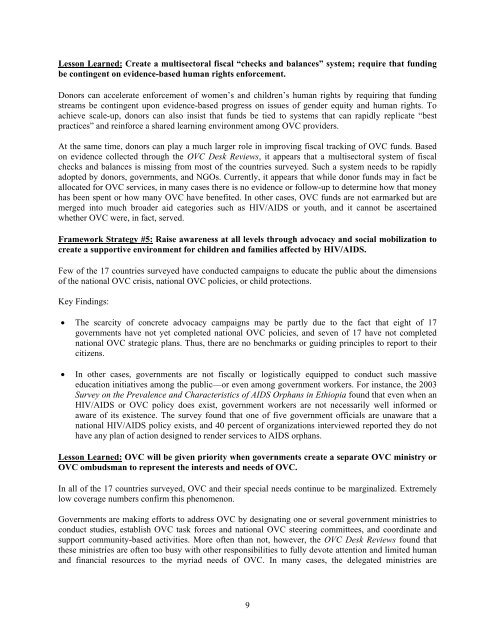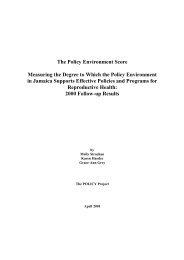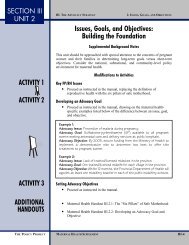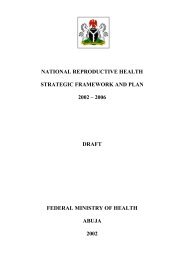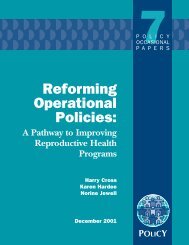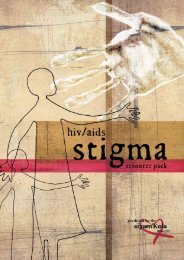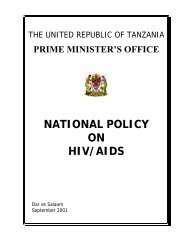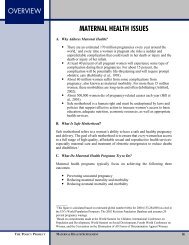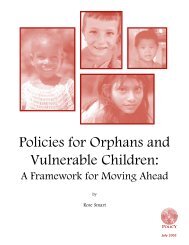THE OVC RAAAP FINAL REPORT - POLICY Project
THE OVC RAAAP FINAL REPORT - POLICY Project
THE OVC RAAAP FINAL REPORT - POLICY Project
You also want an ePaper? Increase the reach of your titles
YUMPU automatically turns print PDFs into web optimized ePapers that Google loves.
Lesson Learned: Create a multisectoral fiscal “checks and balances” system; require that funding<br />
be contingent on evidence-based human rights enforcement.<br />
Donors can accelerate enforcement of women’s and children’s human rights by requiring that funding<br />
streams be contingent upon evidence-based progress on issues of gender equity and human rights. To<br />
achieve scale-up, donors can also insist that funds be tied to systems that can rapidly replicate “best<br />
practices” and reinforce a shared learning environment among <strong>OVC</strong> providers.<br />
At the same time, donors can play a much larger role in improving fiscal tracking of <strong>OVC</strong> funds. Based<br />
on evidence collected through the <strong>OVC</strong> Desk Reviews, it appears that a multisectoral system of fiscal<br />
checks and balances is missing from most of the countries surveyed. Such a system needs to be rapidly<br />
adopted by donors, governments, and NGOs. Currently, it appears that while donor funds may in fact be<br />
allocated for <strong>OVC</strong> services, in many cases there is no evidence or follow-up to determine how that money<br />
has been spent or how many <strong>OVC</strong> have benefited. In other cases, <strong>OVC</strong> funds are not earmarked but are<br />
merged into much broader aid categories such as HIV/AIDS or youth, and it cannot be ascertained<br />
whether <strong>OVC</strong> were, in fact, served.<br />
Framework Strategy #5: Raise awareness at all levels through advocacy and social mobilization to<br />
create a supportive environment for children and families affected by HIV/AIDS.<br />
Few of the 17 countries surveyed have conducted campaigns to educate the public about the dimensions<br />
of the national <strong>OVC</strong> crisis, national <strong>OVC</strong> policies, or child protections.<br />
Key Findings:<br />
• The scarcity of concrete advocacy campaigns may be partly due to the fact that eight of 17<br />
governments have not yet completed national <strong>OVC</strong> policies, and seven of 17 have not completed<br />
national <strong>OVC</strong> strategic plans. Thus, there are no benchmarks or guiding principles to report to their<br />
citizens.<br />
• In other cases, governments are not fiscally or logistically equipped to conduct such massive<br />
education initiatives among the public––or even among government workers. For instance, the 2003<br />
Survey on the Prevalence and Characteristics of AIDS Orphans in Ethiopia found that even when an<br />
HIV/AIDS or <strong>OVC</strong> policy does exist, government workers are not necessarily well informed or<br />
aware of its existence. The survey found that one of five government officials are unaware that a<br />
national HIV/AIDS policy exists, and 40 percent of organizations interviewed reported they do not<br />
have any plan of action designed to render services to AIDS orphans.<br />
Lesson Learned: <strong>OVC</strong> will be given priority when governments create a separate <strong>OVC</strong> ministry or<br />
<strong>OVC</strong> ombudsman to represent the interests and needs of <strong>OVC</strong>.<br />
In all of the 17 countries surveyed, <strong>OVC</strong> and their special needs continue to be marginalized. Extremely<br />
low coverage numbers confirm this phenomenon.<br />
Governments are making efforts to address <strong>OVC</strong> by designating one or several government ministries to<br />
conduct studies, establish <strong>OVC</strong> task forces and national <strong>OVC</strong> steering committees, and coordinate and<br />
support community-based activities. More often than not, however, the <strong>OVC</strong> Desk Reviews found that<br />
these ministries are often too busy with other responsibilities to fully devote attention and limited human<br />
and financial resources to the myriad needs of <strong>OVC</strong>. In many cases, the delegated ministries are<br />
9


